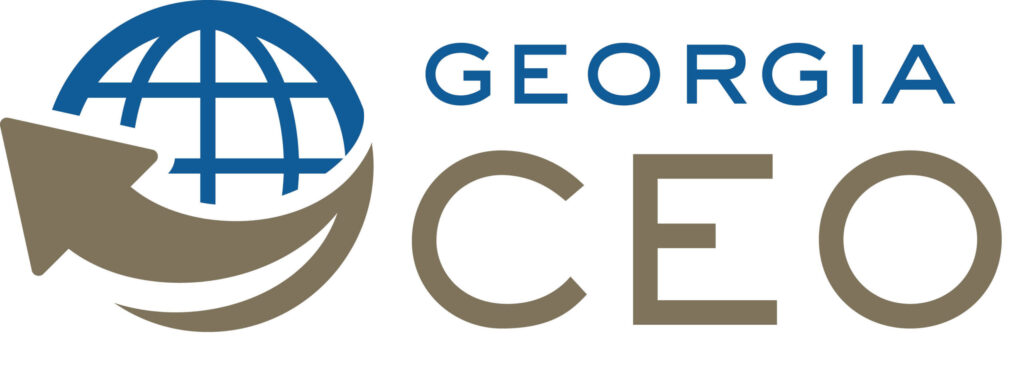2023 BUSINESS GENEROSITY REPORT:
You Need People, But What Do People Need?
What Do Employees Actually Value From Their Employer?
Once again, goBeyondProfit’s data confirms that generosity remains a driving factor behind employees’ choice of workplace. While this may or may not be surprising, the crucial takeaway lies in the gap between what companies currently offer and employees’ evolving priorities. If you’re wondering how to prioritize limited funds, employed adults provide clear direction.
Respondents were offered a comprehensive list of ways an employer can demonstrate generosity.
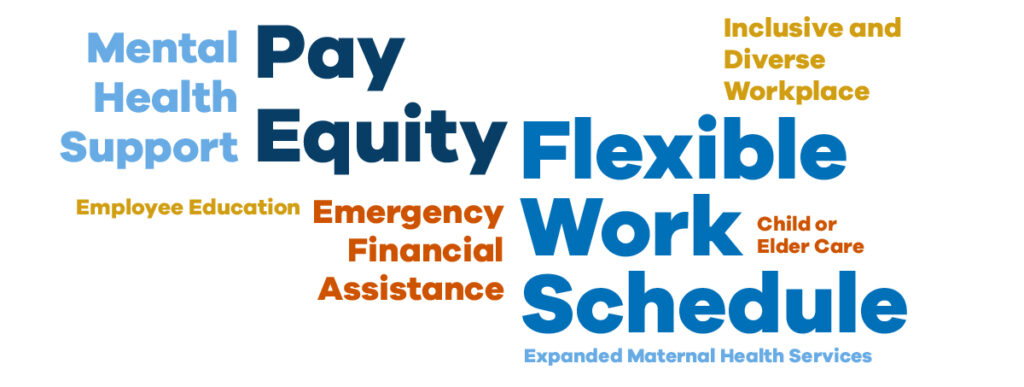
Continuing the trend from 2022, Flexible Work Schedules and Mental Health Support remain at the top of the list. However, a new priority (Pay Equity) has also emerged as a top request.
Why Is Everyone Asking For Pay Equity?
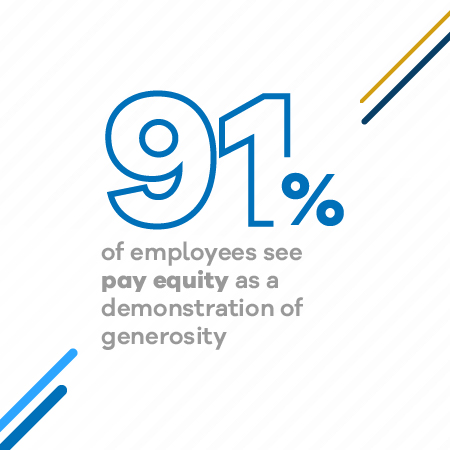
A remarkable 91% of employee respondents selected pay equity as an important way for a company to demonstrate generosity to employees, with 64% naming pay equity as very important.
Historically, the discussion around pay equity has focused on the compensation disparity between men and women. However, since 91% of all respondents say it is very or somewhat important, goBeyondProfit collected additional data to understand what employees specifically mean by pay equity – the findings might surprise you.*
The Loyalty Penalty
When given the opportunity to select their top two concerns regarding pay equity, a surprising 43% of those surveyed responded that new hires make more than employees who have worked at the company for years. This concern, shared equally by women (45%) and men (42%), ranked as the number one choice for both men and women.
Research by Korn Ferry supports this finding that your most loyal employees who have been with your company the longest might be the ones questioning the wisdom in their decisions to stay. Additional research by ADP verifies this concern, as the overall salary of people who changed jobs recently increased by 13.1%, nearly twice the 6.7% median salary increase awarded to workers who stayed loyal.

The Gender Pay Gap
The pay equity disparity between men and women is more important to female employees in Georgia than their male counterparts (73% vs. 56%). Interestingly, this definition was most often the second choice for female respondents’ behind concerns that new hires make more than loyal employees.
The pay gap between men and women has narrowed significantly, with women now earning 82 cents for every dollar earned by a male counterpart. However, according to recent Axios reporting, women will not achieve pay parity until 2056 at the current rate of improvement.
Our data also shows that women between the ages of 45 and 54 (67%) are more concerned about pay equity than their younger colleagues (51%). This may reflect that women further along in their careers are experiencing what a recent report by McKinsey describes as the “broken rung” theory, which suggests that women lose the most ground on the first step up to manager, making it that much more difficult to catch up as they continue in their career. For every 100 men promoted from entry-level to manager, only 87 women are given this same opportunity, as are only 82 women of color.
Other Pay Equity Concerns
When asked to select up to two concerns regarding pay equity, our data found that 31% of people are concerned about CEOs making high salaries regardless of the company’s performance. Men are more likely than women to choose this definition (36% vs. 25%) of pay equity, which was male respondents’ second choice behind new hires making less than loyal employees.
Additionally 25% of respondents selected discrimination based on race, ethnicity, sexual orientation, or disability as a top definition for pay equity; however, respondents of color are more likely to select this definition (33% vs. 22%).
Finally, 18% of respondents defined pay equity as younger employees receiving larger starting salaries and promotions.
Pay equity is not a new concern but has become a more universal request in the wake of the Great Resignation. In our survey, 76% of leaders of large companies (500+ employees) say they are already addressing pay equity concerns, while only 41% of leaders of mid-sized companies (100-499 employees) and 48% of leaders of small companies (fewer than 99 employees) express the same. Accordingly, mid-sized and small companies have the most opportunity to gain favor by addressing this concern.

Flexibility Isn’t a Fight About Returning to the Office
For the second consecutive year, flexible work remains the top-ranked demonstration of generosity for all respondents and is equally valued by men and women. To help executives understand what employees specifically mean by “flexible work,” goBeyondProfit collected additional data.*
For most respondents (41%), flexible work is defined as the ability to balance work and life demands as they arise without having to take PTO – a definition shared by both men (39%) and women (44%).
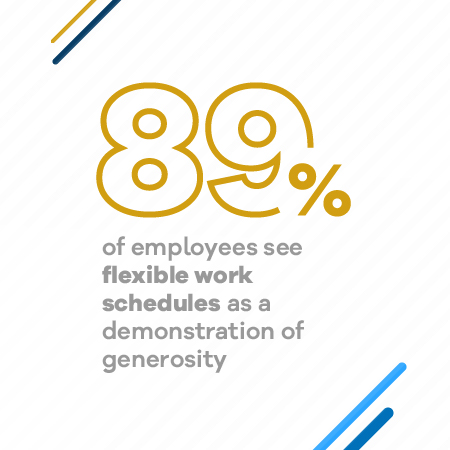
Additionally, many see flexible work as a modified work week (24%), such as four-day work weeks or adjusted shifts. Another 22% of people see flexible work as simply being entrusted with completing their duties when and where they decide. Very few people (10%) consider flexible work schedules to mean a company policy of specific days in the office and at home.
With employee retention a stated concern for executives, offering flexibility may enable leaders to attract and retain talent. In fact, a flexible work schedule might not only lower expenses (overhead on office rentals, administrative supplies, etc.) but also increase employee engagement and productivity, as shown in a recent study by Hubspot.
In goBeyondProfit’s survey, most executives (68%) said that their companies currently offer flexible work schedules. However, Georgia still presents a wide gap between the number of companies offering flexibility (68%) and the number of employees who see flexible work schedules as important (89%), presenting a major opportunity for businesses of all sizes.
Mental Health Support Remains a Top Priority for Employees
Last year, the goBeyondProfit report signaled a red flag about the state of mental health in the workplace. Yet, a year later, only 41% of executives state they currently offer mental health support, even though a full 88% of employees continue to name mental health support as a top demonstration of generosity.
This year, we revisited this concern and discovered pervasive levels of burnout throughout Georgia companies, including among executives. We offer employers additional data-driven insights and solutions for increased wellness in the workplace in Burnout Dilemma – Are You Asking the Right Questions?
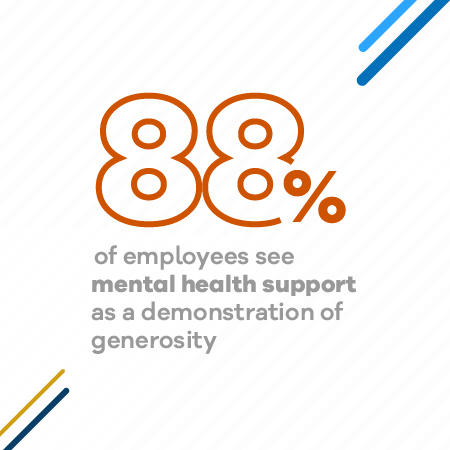
Additionally, goBeyondProfit interviewed a workplace mental health expert to provide executives with tangible action steps for helping employees. [See Expert Interview Series: Reducing Burnout at Work]
Next Steps With Diversity and Inclusion Initiatives
Since 2020, we’ve seen a significant increase in the number of companies prioritizing inclusion and diversity in the workplace. In 2023, 68% of executives say they are currently investing in an inclusive and diverse workplace.
As this commitment continues, it is important to highlight the significant changes in what respondents of color consider the most important demonstrations of generosity.

According to this year’s survey, Georgia employed adults of color placed a much higher emphasis on mental health support (6 percentage points more), expanded maternal health services (16 percentage points more), and childcare or eldercare support (14 percentage points more) as demonstrations of generosity.
It is especially worth noting that Georgia continues to top the list of all 50 states with the highest maternal mortality rate in the country. A recent study by The National Institute of Health shows that Georgia has 46.2 maternal deaths per 100,000 live births for all women, jumping to 66.6 for African American women. This figure represents a 44% higher death rate among women of color.
As workplaces achieve greater diversity, it is crucial for executives to factor in the divergent needs and experiences of employees and prioritize generosity efforts accordingly.
* Supplemental data on the deeper meaning of pay equity and flexible work schedules was gathered through an omnibus survey of employed adults in partnership with Qualtrics.
Explore further insights:
In Partnership with
